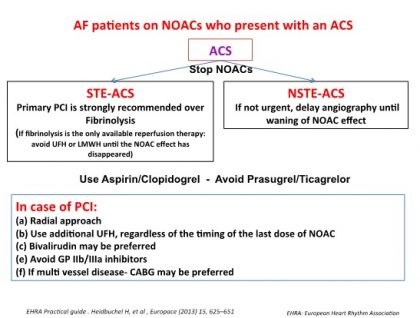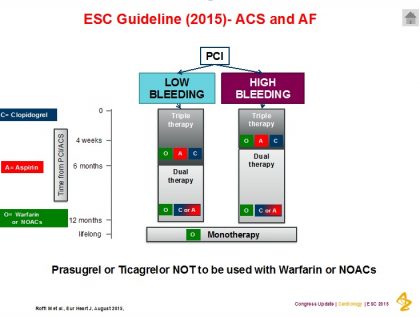- Home
- Editorial
- News
- Practice Guidelines
- Anesthesiology Guidelines
- Cancer Guidelines
- Cardiac Sciences Guidelines
- Critical Care Guidelines
- Dentistry Guidelines
- Dermatology Guidelines
- Diabetes and Endo Guidelines
- Diagnostics Guidelines
- ENT Guidelines
- Featured Practice Guidelines
- Gastroenterology Guidelines
- Geriatrics Guidelines
- Medicine Guidelines
- Nephrology Guidelines
- Neurosciences Guidelines
- Obs and Gynae Guidelines
- Ophthalmology Guidelines
- Orthopaedics Guidelines
- Paediatrics Guidelines
- Psychiatry Guidelines
- Pulmonology Guidelines
- Radiology Guidelines
- Surgery Guidelines
- Urology Guidelines
Use of Antiplatelet & Anticoagulation in PCI & AF - Dr Jamshed J Dalal

Fig 1

Another important issue is how to manage the antiplatelet and anticoagulation therapy after the stent implantation. European Society of Cardiology has laid out clear guidelines that are easy to follow, balancing the bleeding risk with the issue of stent thrombosis.
Fig 2, shows that the duration of dual antiplatelet therapy should be determined on the basis of high or low bleeding risk, trying as best as possible to keep the duration of triple therapy to a minimum. It is important to note that at the end of one year only anticoagulation without any antiplatelet therapy will suffice.
FIG 2

Data from WOEST study has suggested that clopidogrel is safer than aspirin when combined with warfarin. We however have no such data regarding whether aspirin or clopidogrel should be used with NOACs.
There are multiple recent trials including ATLAS, PIONEER and GEMINI, which have looked at the combination of smaller dose of Rivaroxaban, and the REDUAL-PCI study with Dabigatran, along with antiplatelet agents to identify the optimal doses of these drugs in the management of patients who need both antiplatelet and anticoagulation therapy following PCI. This situation requires individualization and really represents the art of practicing medicine
The Author, Dr Jamshed J Dalal is the Director-Cardiology at Kokilaben Hospital, Mumbai and he is presenting on the topic -Use of Antiplatelet & anticoagulation in PCI & AF at India Live 2018

Disclaimer: This site is primarily intended for healthcare professionals. Any content/information on this website does not replace the advice of medical and/or health professionals and should not be construed as medical/diagnostic advice/endorsement or prescription. Use of this site is subject to our terms of use, privacy policy, advertisement policy. © 2020 Minerva Medical Treatment Pvt Ltd